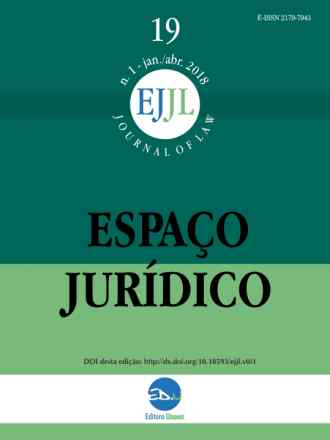PLURALISMO JURÍDICO E JUSTIÇA COMUNITÁRIA: CONTRIBUINDO PARA JURIDICIDADE ALTERNATIVA
Espaço Jurídico
PLURALISMO JURÍDICO E JUSTIÇA COMUNITÁRIA: CONTRIBUINDO PARA JURIDICIDADE ALTERNATIVA
Autor Correspondente: Jackson da Silva Leal | [email protected]
Palavras-chave: Pluralismo JurÃdico, Justiça Comunitária, América Latina, Sociologia do Direito, Emancipação Social.
Resumos Cadastrados
Resumo Português:
Trata-se de um estudo que busca identificar no contexto de pluralismo jurÃdico e no espaço geopolÃtico latino-americano manifestações de uma juridicidade emancipatória, produzida fora da concepção monista do direito tradicional, por sujeitos historicamente (so)negados em sua cultura popular. A análise ocorre a partir da investigação sobre a manifestação de justiça comunitária no contexto de paÃses andinos e uma justiça alternativa na territorialidade brasileira, em suas diversas modalidades e mecanismos, diante da inserção de uma teoria da sociologia das ausências e uma sociologia das emergências como paradigma jurÃdico para o Sul global a partir das ideias de Boaventura de Sousa Santos. Tal tarefa cumpre afirmar outras formas de justiça, diferenciada da tradição jurÃdica liberal de produção do direito atomizado em indivÃduos isolados, voltando os olhares para as realidades periféricas latino-americanas, em que há inserção de uma nova racionalidade jurÃdica germinada com Ãmpeto emancipatório de alteridade. Consta da metodologia a análise bibliográfica; pesquisa documental indireta e um método procedimental comparativo e sociológico das experiências manifestadas em diferentes realidades do continente latino-americano se utilizando como marco teórico o Pluralismo JurÃdico de tipo comunitário e participativo proposto por Antonio Carlos Wolkmer. Busca-se demonstrar como os resultados de manifestações diferenciadas ou alternativas de justiça produzidas para integração, identidade e pertinência social dos sujeitos envolvidos, podem apresentar um viés de direito crÃtico à epistemologia jurÃdica europeizada, atomizada, excludente e hegemônica/colonizadora.
Resumo Inglês:
It is a study that seeks to identify in the context of legal pluralism and the Latin American geopolitical space manifestations of an emancipatory legality, produced outside the monistic conception of traditional law by historically subject (so) denied in its popular culture. The analysis starts from the investigation on the expression of community justice in the context of the Andean countries and an alternative justice in the Brazilian territory, in its various forms and mechanisms, due to the inclusion of a theory of sociology and sociology of absences and emergencies legal paradigm for the global South from the ideas of Boaventura de Sousa Santos. This task meets other forms of justice to say, different from the liberal legal tradition of production in the right atomized individuals, turning their eyes to the realities of Latin American periphery, where there is insertion of a new legal rationale germinated with emancipatory thrust of otherness. Methodology contained in the literature review, desk research and an indirect method and sociological comparison of procedural experience different realities expressed in the Latin American continent is using as a theoretical framework of legal pluralism and participatory community type proposed by Antonio Carlos Wolkmer. It also demonstrates how the results of different manifestations of justice produced or alternatives for integration, identity and social belonging of the subjects involved, may have a bias to the right critical Europeanized legal epistemology, fragmented, exclusionary and hegemonic / colonization.

